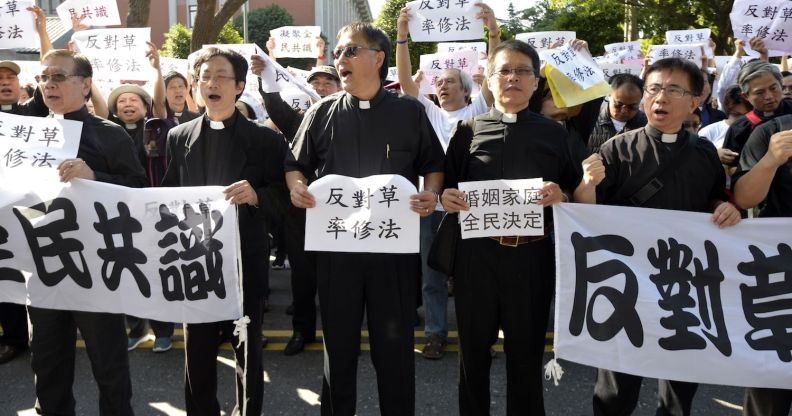Taiwanese President says gay marriage debate moved from ‘conflict’ to ‘dialogue’

The President of Taiwan has said that the process to introduce same-sex marriage in the country has moved on from “conflict” into the “dialogue” phase.
President Tsai Ing-wen on Saturday said that the debate around same-sex marriage, which in December passed the first hurdle to be legalised in Taiwan, has moved on.
He said: “We are in the same situation right now and we are handling this step by step. In the previous stage we saw conflict, but now we are turning to dialogue,” Tsai said.
President Tsai Ing-wen said following protests in favour of the bill: “Let’s not treat the people around us as enemies.”
Protests gathered in Taiwan on both sides of the debate as polls suggested that support for same-sex marriage in the country was being outweighed by opposition.
The Committee in Taiwan’s Legislature passed an amendment to include same-sex marriage in the Civil Code of the country back in December.
The bill would change the definition of marriage to specify it is between two people, rather than between a “man and woman”.
As the legislation heads towards Parliament, hopes are high that it could pass – making Taiwan the first country in Asia to permit same-sex couples to marry. The country’s President, Tsai Ing-wen of the Democratic Progressive Party, previously expressed support for equal marriage.
There is some opposition to the legislation, however, primarily from Western-inspired fundamentalist church groups, who have some influence in the region.
The anti-LGBT Alliance of Religious Groups for the Love of Families Taiwan has vowed to protest the change.
The group’s head Chang Shou-yi fumed: “What gay activists want is for their lifestyle to be affirmed by society, but why do they need to change the traditional institution of marriage, which goes back thousands of years?”
Also this week, the country’s Ministry of Health and Welfare published draft regulation to ban medical professionals from performing harmful gay ‘cure’ therapies which could come into effect as soon as March.

